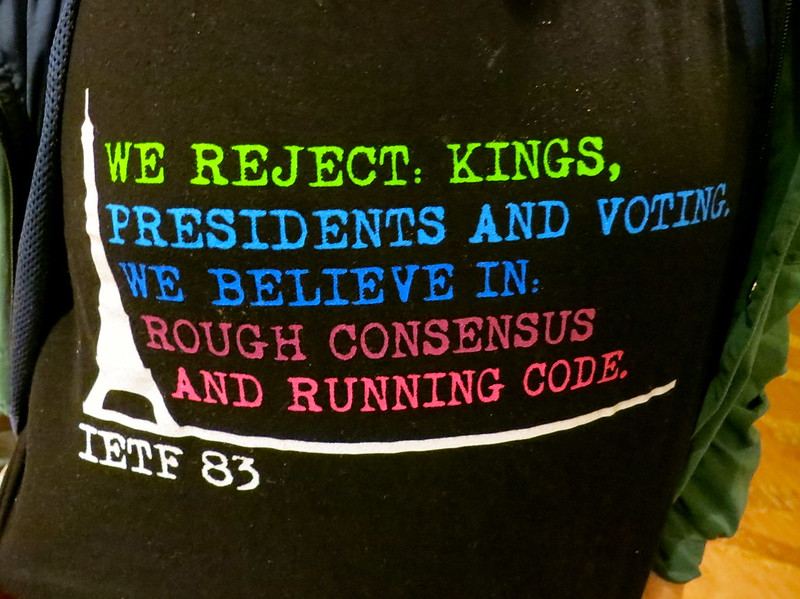A standardisation section for the Digital Markets Act
This is a great post by long-time IETF standardiser Mark Nottingham, on the benefits of competition regulators designating technical standards from the IETF and W3C for interoperability requirements placed on gatekeepers, rather than de facto API-standards managed by those gatekeepers, and/or potentially conflicting national regulator requirements (and how those standards bodies need to develop their own processes to strengthen their multistakeholder legitimacy.)
I recommended this in my reports last November as well. IETF and W3C have well-developed instant messaging and social media standards, which the European Commission or regulators should be able to require gatekeepers to comply with under the Digital Markets Act (once it has been amended to cover these core platform services!) As Mark and several of my interviewees noted, it would be vital to curb the current dominance of large tech companies in those bodies first.
Such designation of IETF/W3C standards would be possible under the “further specification” process for DMA Article 6 obligations if the Commission so chose. But to make this more specific, Art. 39 of the Electronic Communications Code has related language, which I have tweaked as below to be inserted into the Digital Markets Act by any MEPs or Member States that agree this should be explicitly stated. (Without the “such as W3C and IETF” part of para. 1, the risk is the Commission would waste years by asking the European Telecommunications Standards Institute to re-implement XMPP/SIMPLE/ActivityPub/etc. in a pointless “regional” standard.)
UPDATE 23/6/21: The draft report from the Internal Market Committee of the European Parliament includes a new Article 36a on standardisation, which specifies:
To facilitate the compliance of gatekeepers with and the enforcement of the obligations in Articles 5, 6, 12 and 13, the Commission shall, where appropriate, issue guidelines accompanying the obligations set out in those Articles . Where appropriate and necessary, the Commission may authorise the standardisation bodies to develop standards to facilitate the implementation of the obligations.
Amendment 106
An additional sentence at the end could do the trick:
When available, the Commission should instead identify appropriate, widely-used ICT technical standards from other standards organisations (such as the Internet Engineering Task Force and World Wide Web Consortium) that meet the requirements set out in Annex II of Regulation 1025/2012.
Standardisation
1. The Commission shall draw up and publish in the Official Journal of the European Union a list of non-compulsory standards or specifications to serve as a basis for encouraging the harmonised provision of core platform services and associated facilities and associated services. This should include technical standards from international standardisation organisations such as the World Wide Web Consortium and Internet Engineering Task Force.
2. Member States shall encourage the use of the standards or specifications referred to in paragraph 1 for the provision of services, technical interfaces or network functions, to the extent strictly necessary to ensure interoperability of services, end-to-end connectivity, facilitation of provider switching and portability of numbers and identifiers, and to improve freedom of choice for users.
3. If the standards or specifications referred to in paragraph 1 have not been adequately implemented so that interoperability of services in one or more Member States cannot be ensured, the implementation of such standards or specifications may be made compulsory under the procedure laid down in paragraph 4, to the extent strictly necessary to ensure such interoperability and to improve freedom of choice for users.
4. Where the Commission intends to make the implementation of certain standards or specifications compulsory, it shall publish a notice in the Official Journal of the European Union and invite public comment by all parties concerned. The Commission shall, by means of implementing acts, make implementation of the relevant standards compulsory by making reference to them as compulsory standards in the list of standards or specifications published in the Official Journal of the European Union.
5. Where the Commission considers that the standards or specifications referred to in paragraph 1 no longer contribute to the provision of harmonised services, no longer meet consumers’ needs or hamper technological development, it shall remove them from the list of standards or specifications referred to in paragraph 1.
6. Where the Commission considers that the standards or specifications referred to in paragraph 4 no longer contribute to the provision of harmonised services, no longer meet consumers’ needs, or hamper technological development, it shall, by means of implementing acts, remove those standards or specifications from the list of standards or specifications referred to in paragraph 1.
7. The implementing acts referred to in paragraphs 4 and 6 of this Article shall be adopted in accordance with the examination procedure referred to in Article 118(4) of the European Electronic Communications Code (Directive 2018/1972).
